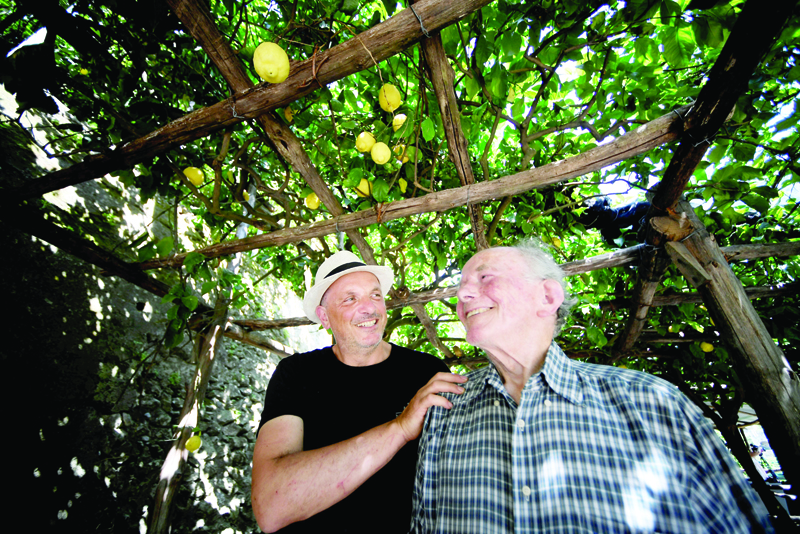
AMALFI, Italy: Squeezed by foreign competition and a lack of local labor, Italy's Amalfi lemon growers persevere in their grueling work on the steep terraces rising from the Mediterranean. "My father always tells me that we might not have blood in our veins but lemon juice," laughs sixth-generation lemon farmer Salvatore Aceto, 56.
"It could be true," he smiles, from beneath the rim of his straw hat. Salvatore and his brother Marco farm the land that their great-great-grandfather started to acquire in 1825 following in the footsteps of his own father. The farm has faced three "unprecedented" blows in the last eight months, Salvatore said, the last of which has been the devastating coronavirus pandemic.
Guarding 'human heritage'
Their father, Luigi, 85, also still works on the farm, which produces 50-70 tons of lemons a year, arriving at around 4 am or 5 am. He drives up the coast in a tiny 1960s Fiat 500, which his wife, an obstetrician, would use to help deliver the coast's babies. The farm covers 13 hectares, of which 2.6 hectares are lemon trees. "Lemons are my life, they're in my heart," said Luigi, confessing with a cheeky smile that he himself was "conceived under a lemon tree".
Today, he feels like "the guardian of a piece of human heritage", which is farmed in much the same way as it has been done for centuries. "We have mules and donkeys to carry the harvest, as well as other types of donkey… us, we humans," jokes Salvatore. "Here, everything is vertical. We work with our legs, shoulders, we're bruised, scratched… Some talk about 'heroic farming', but we're not heroes, just normal people," he said. Agriculture on steep terraces like these can also be found on the islands of Lampedusa and Procida, as well as in the northern Cinque Terre region. The job of climbing up and down hundreds of steps a day, carrying lemon-filled baskets weighing up to 60 kilos, is punishing, and not popular with young, local workers.
Who will cultivate the land?
"Until the '60s and '70s, the terraces of the Amalfi coast provided a livelihood for entire families," Salvatore said. "But the social and economic dynamic has changed. Today, 95 percent of the coast's economy is based on tourism. "Who can you get to cultivate the land?" he said, adding that a job as a waiter offers an easier life-and doesn't involve having to climb 1,500-2,000 steps with 57 kilos on your back. "Nobody wants to make the sacrifice. Young people have practically all given up," he added. Like other farmers around here, he hires workers from Ukraine or Romania when necessary, praising the "priceless" job they do.
'Tragedy'
Salvatore says it's a "tragedy" to see so many local farmers give up in the face of the difficulties. "Seeing so many terraces abandoned is like a dagger in my heart," he added. He said they couldn't compete with the Argentine, Uruguayan, Moroccan, Spanish or Turkish markets, which are automated and have low growing costs.
"To cover our costs, we would have to ask over two euros a kilo (compared to 1.40-1.50 euros at the moment), that's not possible," he said. As a result, the decision was taken to open up the precious terraces to "agriturismo" in 2013, allowing visitors to come, sample and buy homemade limoncello liqueur. No more than 100 people are allowed to visit a day to preserve the citrus trees and also the farm's way of life-although the family recognized that opening up to visitors was key to surviving.
Recent times have been hard. In December, the terraces collapsed because of heavy rain, which was "an economic disaster", Salvatore lamented. "Then the lemon harvest was bad because of the cold and wet weather, which affected the blossom," he added. Finally, he continued, the COVID-19 pandemic struck, halting tourism and slowing sales. "If we can survive this, we'll be invincible." - AFP










